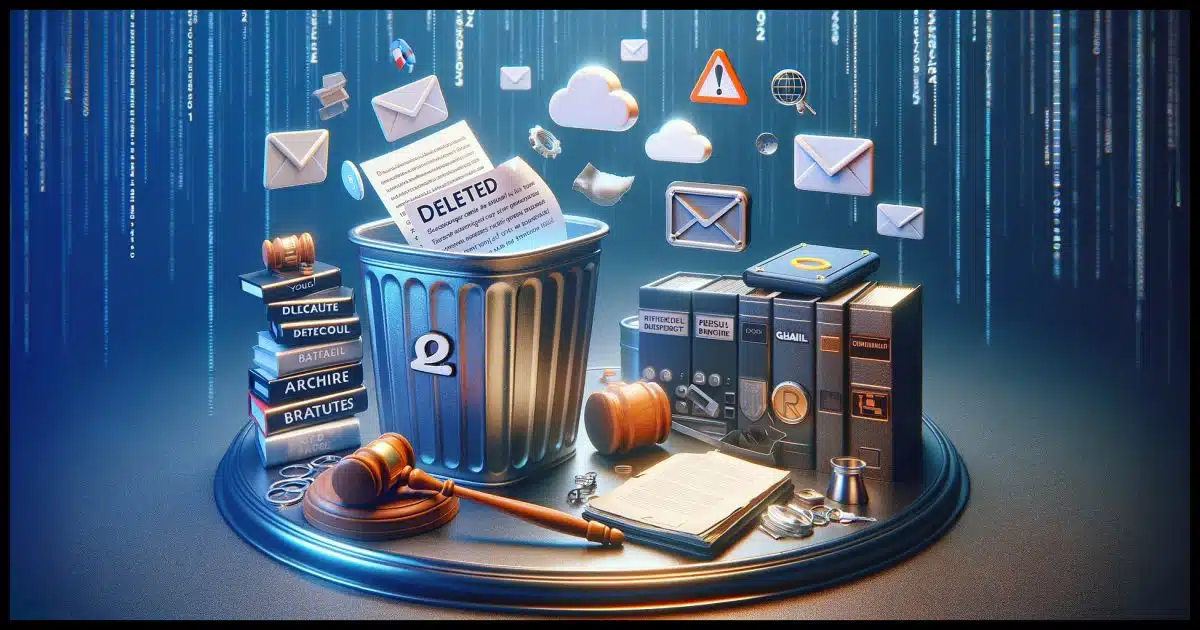Permanent means permanent… mostly.

It seems like such a direct and simple question would result in a direct and simple answer.
In a practical sense, I suppose, the answer would be “Yes, as far as you’re concerned, they’re really gone and they cannot be recovered.”
But that qualification — “as far as you’re concerned” — opens up a Pandora’s box of possibilities.
Whether those possibilities matter depends on why you’re asking.
Become a Patron of Ask Leo! and go ad-free!

Recovering deleted email
When you delete emails from online mail services, they’re generally gone for good, especially if they’re not in a Trash or Archived folder and the grace period has passed. Emails might still exist in backups made by these services, but those are for their purposes, not yours. Legal scenarios could theoretically access these backups. Elsewhere, emails might still be with the original sender or receiver or saved on your own devices if downloaded.
Sometimes, delete isn’t delete
If you’re asking about an email that you deleted from your email account, it’s possible that it’s still there in two fairly common cases.
- If the service uses something like a Recycle Bin or Trash folder, a delete moves the message into that folder. After some period of time (usually 30 days), the message is permanently deleted. Within those 30 days, however, you can easily recover the message.
- In Gmail specifically, you’re encouraged to keep everything. Rather than deleting email, the default action is to use the Archive command. This does nothing more than remove the Inbox label. The message remains in All Mail, and you can easily retrieve it.
Let’s assume you’re not in either of those situations. Either 30 days has passed and/or you didn’t use some form of archive.
When delete means delete
If your email service doesn’t use a Recycle Bin, you empty it, or you tell Gmail to delete and not archive the email, then yes, the email is deleted and you cannot recover it.
Usually.
Outlook.com provides some support for retrieving emails that have been deleted from your account. A “Recover items deleted from this folder” link is typically present in the Deleted messages folder, promising to recover “as many as they can”. I’ve heard it’s around five days worth.
Past that date, and in other services, you’re probably out of luck. Deleted email is gone forever.
Or is it?
Email services back up too
Like any good service provider — and for that matter, any conscientious computer user — mail services regularly back up the data stored on their computer’s disks.
Presumably this would include the mail stored there.
Those backups, assuming that they happen regularly, are preserved for some length of time so as to be able to be restored in the case of some type of system failure. Hardware and software failure do happen, and the only way to protect from data loss in these cases is to have a backup.
Your messages might be on that backup.
If it exists.
There are two problems.
- We don’t know how long the service keeps the backups. It could be days, weeks, months, years; we just don’t know.
- The backups are for the service’s benefit, not yours. That means you cannot ask for something to be recovered from those backups.
So your messages might be there or they might not, but you have no way to get them anyway.
Or do you? Or, rather, does someone else?
A risk that might concern some
The question is this: what happens when an email service that does keep backups gets served with a court order to produce the contents of your email box as of a certain date in the past… perhaps a date on which the email that you later deleted was in your mailbox?
Theoretically, the email service could retrieve their backup and extract the email you deleted from it.
There are many “ifs” to this scenario:
- If they have backups.
- If they keep them long enough.
- If the backup was taken while the email was in your mailbox.
- If the court decided it was important enough to issue a warrant.
- And so on.
It’s not a likely scenario, and one that most of us should never have to worry about.
Two more practical places it could be
Email is a message sent from one person to another.
You might have deleted it, but what about the person you sent it to or received it from? The message may remain with that other person.
And finally, if you downloaded that email or an attachment to your own computer by using a desktop email program (or simply downloading the attachment directly), there are various scenarios, including your own backups, that could make the message recoverable. The chances are typically slim, but it’s another place to consider.
Do this
Be careful what you delete. If there’s even the slightest possibility you might need it in the future, hang on to it. Using a desktop email program to back up your email, and perhaps organizing offline archives, is a great way to do this.
Subscribe to Confident Computing! Less frustration and more confidence, solutions, answers, and tips in your inbox every week.





I deleted my email account On July 3rd…..so,what’s my chances of retrieving it back and what do I need to do to try and get it back…..My email is {email address removed]…..thanks a lot, please help….Karen Krueger
Contact the email provider.
Once again, MailStore email archive program might be worth investigating:
https://www.mailstore.com/en/
But with the “free” version, there is no automated backup/archive function – you must remember to perform regular backups/archives. Still, better than a kick in the pants. The paid version apparently does have automated backups.
I have MailStore (free version) setup to backup my email from my paid IMAP email service, Outlook.com, Gmail and my email client program, Thunderbird (including TBird’s Local folders). I have to run the backup four times, once for each account (you create an “account” in MailStore for each service or email client). The IMAP service has several folders that I’ve created that are on the server and mirrored within Thunderbird and they get backed up/archived when running MailStore for that IMAP service.